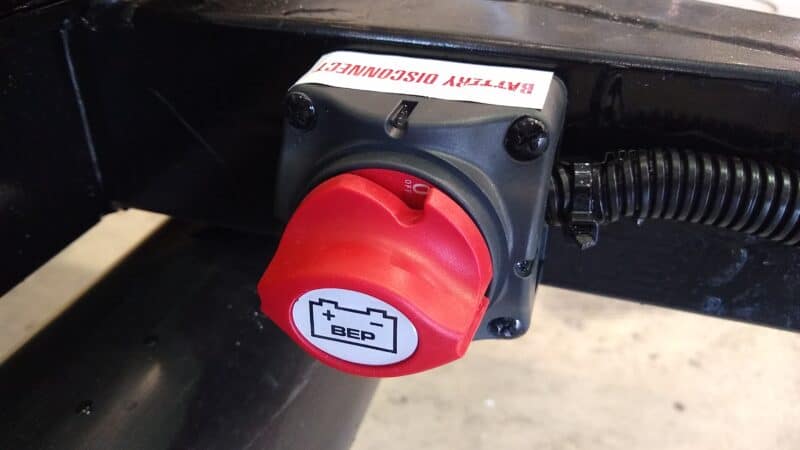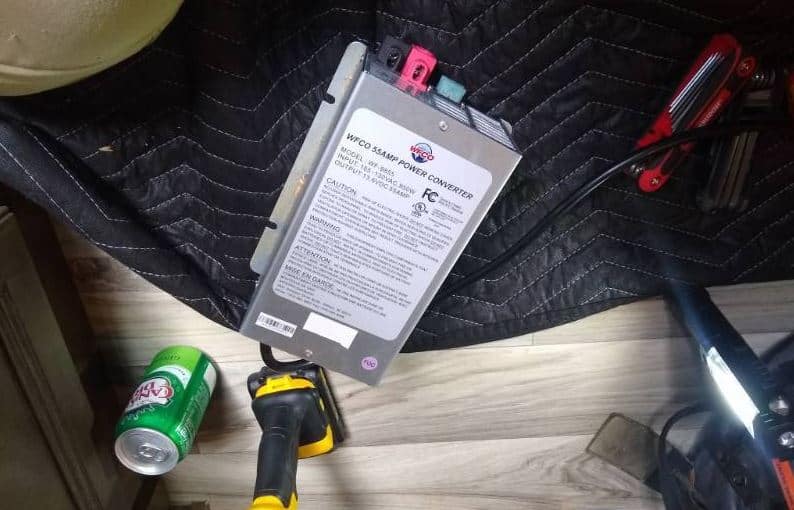There is a common misconception among new RV owners that you should disconnect your house batteries when plugged into shore power (something about issues arising from multiple power sources).
If you have a modern multi-stage converter, don’t pay this misconception any mind. Outside of a few unique situations, there is no reason to disconnect your house batteries when connected to the grid. You’re just doing yourself a disservice. When plugged in, your converter actually charges your house batteries. If you disconnect, you’re just starving your batteries.
In fact, disconnecting your house batteries could actually cause problems, like dead batteries or a fried converter (more on this later). But there are some BIG exceptions to this rule, such as if you have a single-stage charger or you’re putting your RV into hibernation. Let run through these exceptions and see if they apply to you.
What Is an RV Battery Disconnect Switch?
Most RVs have a power switch between the house batteries and the 12V fuse panel. It looks like this (see below), and you’ll generally find it in the same compartment as the house batteries or on the trailer tongue. You may also have an electronic version controlled by a relay or solenoid.

How a disconnect switch is wired depends on the manufacturer. What I’m about to describe is the most common procedure, but refer to your Owners Manual.
Ha ha. That’s a joke. Your manual probably doesn’t tell you anything useful about the DC wiring. Good luck!
Switched Turned ON
- When the switch is turned ON, power flows freely from the battery to the 12V DC electrical system. The battery powers your LED lights, water pump, radio, and other 12V appliances.
- When plugged into shore power with the disconnect switch turned to ON, the battery will charge while the converter takes over the job of supplying 12V power to the loads.
Switched Turned OFF
- When the switch is turned OFF, power is shut off from the battery to the 12V DC electrical system. No power will be drained from the batteries.*
- When plugged into shore power with the disconnect switch turned to OFF, the battery cannot be charged by the converter. The converter can still supply 12V power to the loads, but not to the battery.
*Not always true, unfortunately. Some loads may be wired directly.
But What If I Have a Single-Stage Charger?
For many decades, all RVs were built with single-stage converter chargers. These chargers output a single voltage, usually around 13.2 to 13.6 volts.
For reasons I won’t dive into here, these chargers were to RVs what dodos were to evolution. It’s rather ridiculous how long they were installed in RVs of all sizes, all prices. They were the de facto standard until the early 2010’s.
The big problem with a single-stage converter is that they can cause a battery to boil over. They’ll overcharge it. That’s why it used to be common practice to disconnect your RV house batteries; if you didn’t, you risked overcharging your battery. So yes, if you have a single-stage charger AND you plan on being plugged in longer than a night, you should disconnect your house batteries and charge them with a 3-stage battery tender instead.

Don’t sweat a few hours here and there. You don’t need to disconnect your house batteries the moment you plug into the power pedestal. Just don’t make a habit of leaving your batteries unattended and overcharged for long periods of time, and check the battery electrolyte levels at least once a month.
If you have survived to 2022 without upgrading to a multi-stage converter, I encourage you to make the switch immediately. All the major manufacturers, like WFCO, offer converter replacement kits. I bet you’ll recoup the investment in longer battery life, so don’t delay!
But What If I’m Putting My RV Into Storage?
In most cases, it’s best to disconnect your RV house batteries if you’re putting your RV into seasonal hibernation.
The reason why? Parasitic drains. There are several electrical components in your RV, such as your radio and LP/CO2 detector, which will drain small amounts of power even when turned “off.” Over the course of a winter, you could partially drain your battery and cause sulfation, which is a death knell for any lead-acid battery.
When putting your RV into storage, it’s recommended you either leave your RV plugged in (with a multi-stage converter), disconnect your house batteries, or put your batteries on a battery tender, aka, a trickle charger.
But What If I Have Solar Panels?
Does having rooftop solar panels affect these rules? In general, no. In most RVs – again, some are wired differently – the charging cables from the solar controller are wired directly to the battery terminals. Whether you disconnect the house batteries from the 12V distribution panel or not makes no difference; the solar panels are still hardwired directly to the batteries and can charge them anyway. However, some RVs may have a separate disconnect switch or inline fuse for the solar charging cables, so check your Owners Manual!
But What If I Don’t Have a Subpanel?
It’s important to realize that a converter doesn’t just charge your battery. It also supplies 12-volt electricity to the rest of your system. So while it’s charging the battery, it’s also supplying the power necessary to run your lights, water pump, and other 12V appliances.
In some rare cases, the 12V circuits are wired directly to the battery instead of the converter subpanel. In these cases, if you disconnect the battery, you’ll kill all the 12V circuits. Thankfully, most RVs aren’t wired like this, but (sorry to beat a dead horse), check your Owners Manual!
A Word of Warning: Some Converters Require A Connected Battery!
Not all converters are designed to operate without a connected battery. Some older converters use the battery as a buffer, an electrical filter, and without it, the converter circuit board can burn up from fluctuating voltages.
Thankfully, most modern RV converters can operate without a battery. For instance, Progressive Dynamics allows the use of their Intelli-Power converters without a connected house battery. “The INTELI-POWER series of converters are primarily designed for use with a battery, however, the output of the INTELI-POWER converters are a regulated, filtered DC voltage that can power sensitive electronics without the need for a battery or other filtering.”
Leave a Reply